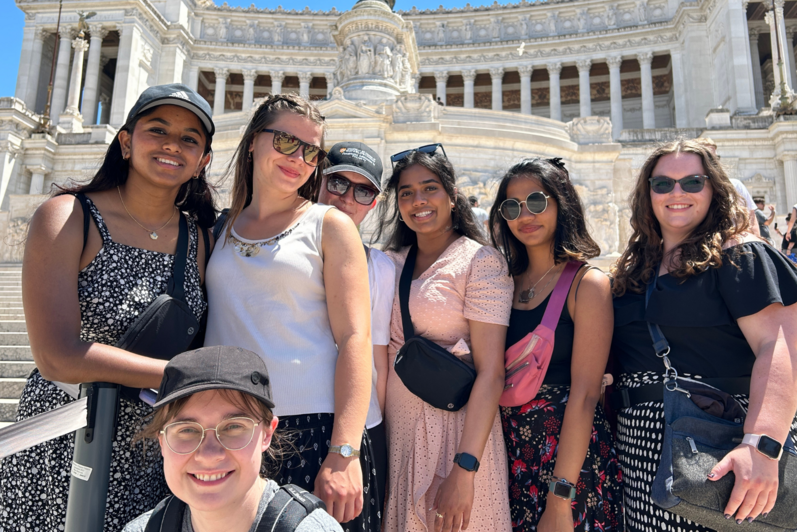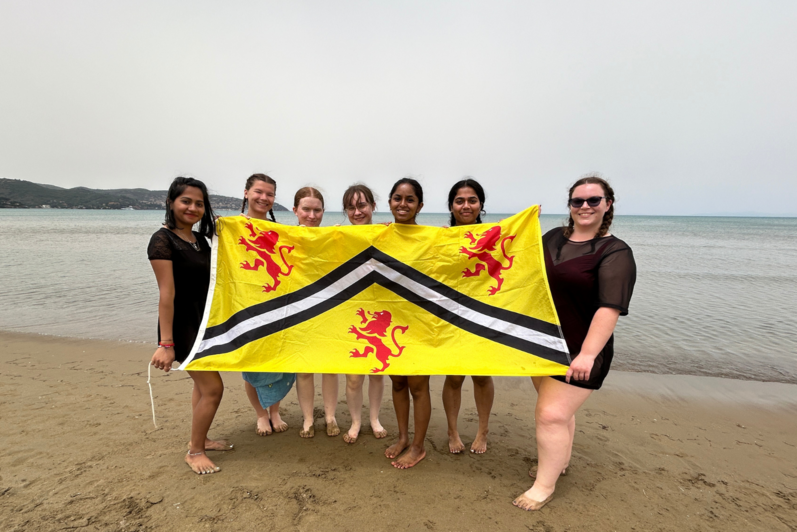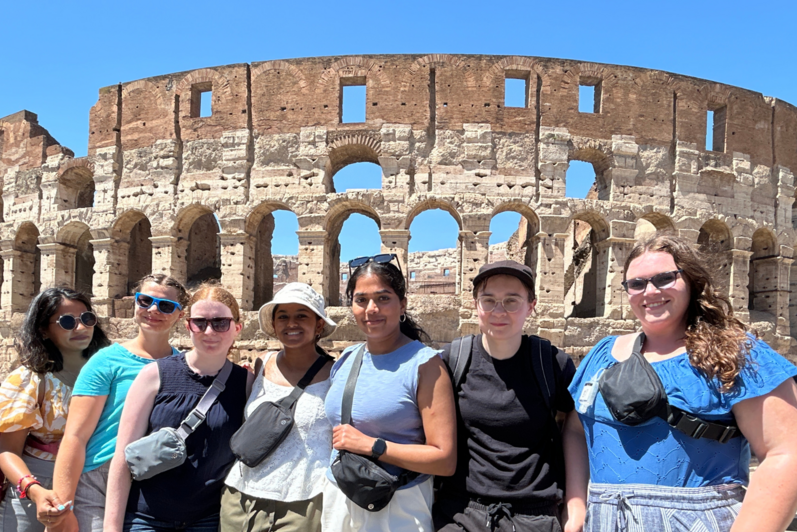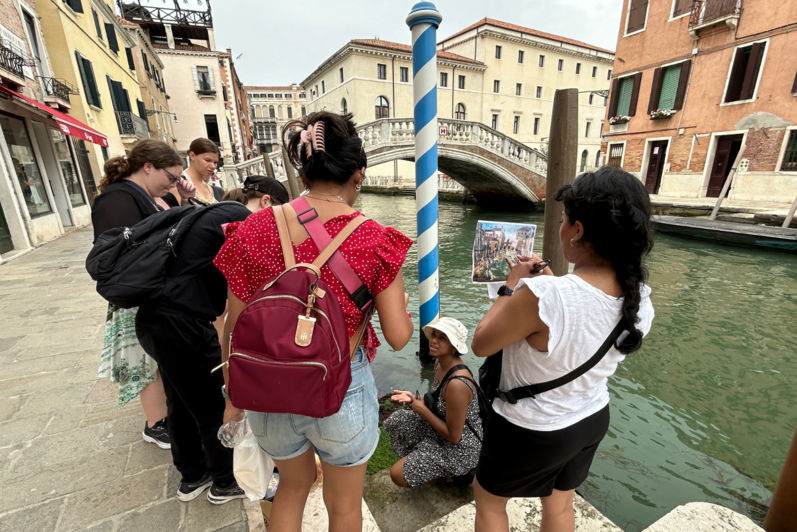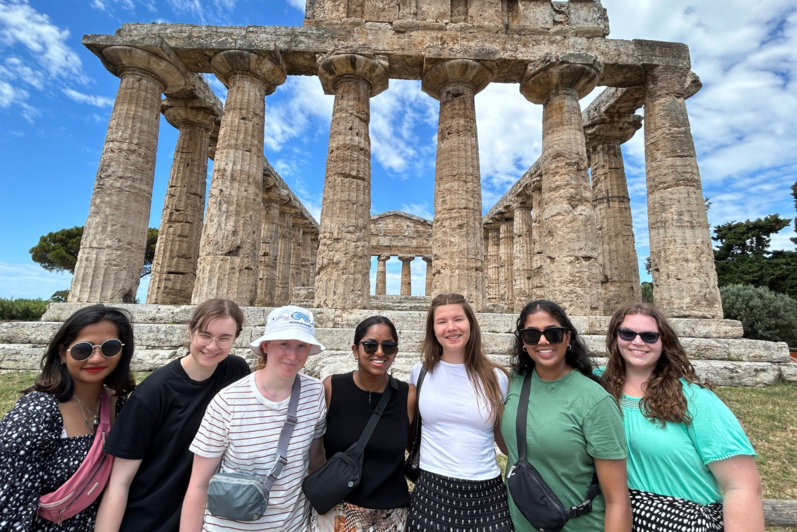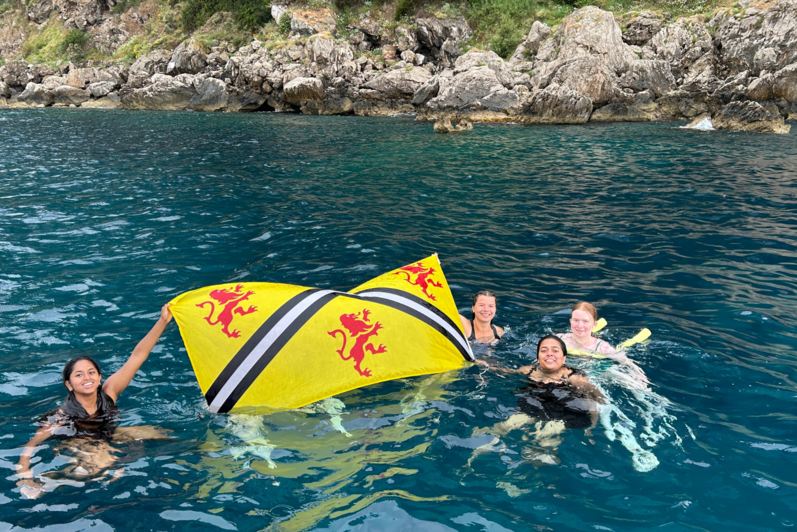By Ria Menon
Using St. Thomas University in Rome as our home base, a group of Science students embarked on an educational and exhilarating journey across Italy, while gaining a field course credit. Our travels took us to stunning beaches, the historic streets of Rome, the enchanting canals of Venice, and the ruins of ancient Pompeii.
Exploring Ancient Rome
Our adventure began in Rome, where we spent our days walking along the Tiber River and exploring Vatican City. One of the fascinating aspects of Rome is its history of flooding. We saw old pillars depicting flood lines throughout the city that show how different regions marked major flooding events. Dean Chris Houser provided short lectures at various tourist destinations, enriching our understanding of Rome’s past.
We also rode bikes around the city to learn about Rome's ancient aqueduct system. Built in 312 BCE, these aqueducts bring fresh drinking water from the mountains into continuously flowing fountains across the city.
We visited the Tiber River Delta to learn about how it’s changed since the time of the Romans. The Tiber River Delta is now 3 km displaced from its original location because of the constant pulse of sediment from the Tiber. It was incredible to walk through what used to be the main docking area for all incoming ships but has now been eroded.
The last of our Rome adventures included visiting the Colosseum, where we learned about its foundation and structural history. The Colosseum is one of the New Seven Wonders of the world and we learned about its rich history filled with gladiators, wild animals, and blood-sport entertainment for the city.
Learning on the beaches
Our coastal studies took us to multiple beaches, each with its own characteristics. We visited the Northwest Coast, the Northeast Coast, the Southwest Coast, the Amalfi Coast and the Isle of Capri for our hands-on learning experiences. Dean Houser did lessons on different types of waves, how beaches are formed, how they change under increasing anthropogenic impacts, and how civilization adapts to the dynamic nature of beaches and coasts. We also learned about various tactics to prevent coastal erosion. These hands-on experiences were invaluable in understanding coastal processes and management.
The city of canals
In Venice, we toured the islands while learning about the city's unique history. We learned about how Venice was formed and why it is gradually sinking. By analyzing historical paintings and comparing them to current water levels, we could see firsthand the progression of Venice’s submersion. We estimated the sinking level of Venice and compared it to published literature and found our results to be very similar to what was estimated and documented.
Exploring ancient ruins and modern farms
Our journey continued with a visit to Pasteum which is an ancient Greek temple and town. Pasteum contained three massive temples dedicated to the Greek gods, Hera, Athena, and Poseidon. We even spoke with researchers excavating the ancient ruins!
Another ancient ruin we visited was Pompeii. In Pompeii, we roamed the ruins frozen in time by the eruption of Mount Vesuvius. After the eruption, Pompeii was covered in 4 to 6 metres of volcanic ash from which the city has been excavated. We walked through historic streets and homes preserved for tourists to explore.
Lastly, we visited a buffalo mozzarella farm where we were taken through the process of making mozzarella from milk to cheese. We experienced the traditional craftsmanship of one of the most beloved Italian cheeses while learning about Italy’s culture!
The Amalfi Coast and Capri
We visited the beautifully scenic Amalfi Coast where we hopped on a ferry to get to the Isle of Capri. A boat tour took us around the island where we saw natural caves and major rockslide residues. We even got a chance to swim in the Mediterranean Sea!
A memorable experience
Our final assignment at the end of our trip was to produce video podcasts on each of these five topics: changing coastlines, why Venice is sinking, the evolution of the Tiber River Delta, how the coast of Italy is protected, and a personal reflection on our experience abroad.
For me, this trip was more than just a tour of Italy - it was an immersive learning experience. From the historical landmarks of Rome to the sinking city of Venice and the ancient ruins of Pompeii, we gained a deeper understanding of the natural and human processes that have shaped these iconic locations. The knowledge and memories we acquired will stay with us forever, reminding us of the rich tapestry of history, culture, and science that Italy offers.
